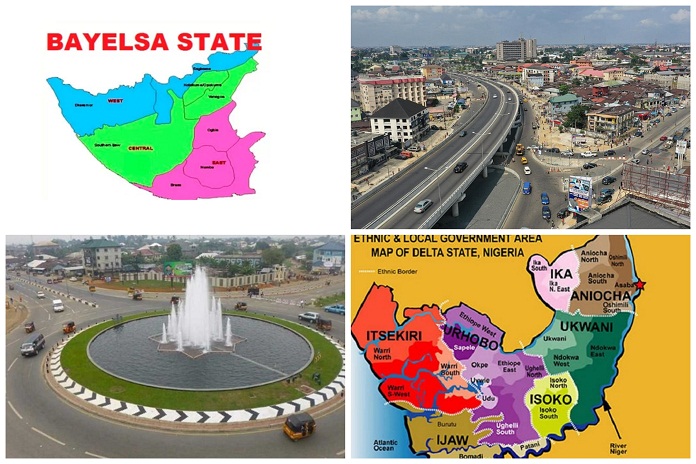The South-South region in Nigeria is made up of six (6) states, including Akwa Ibom, Edo, Bayelsa, Rivers, Delta, and Cross River.
The South-South States in Nigeria are located in the southern part of the country. These States are known for their rich natural resources, particularly oil and gas, which contribute significantly to the Nigerian economy. These states are also home to diverse ethnic groups, including the Ibibio, Efik, Ijaw, Itsekiri, Urhobo, and Edo, among others. The region boasts a unique cultural heritage with vibrant traditional customs, festivals, music, and cuisines. It is also renowned for its beautiful landscapes, including mangrove forests, rivers, and coastal areas.
Moreover, the South-South states in Nigeria are a hub for trade and commerce, attracting local and international investors. The region has a strategic location, with access to ports and waterways, making it a key transportation and logistics center. Despite facing particular challenges, such as environmental degradation and youth unemployment, the South-South states continue to make significant contributions to Nigeria’s development and growth. This article will explore the states in the south-south geopolitical zone in Nigeria.
States in the South-South Geopolitical Zone of Nigeria
1. Akwa Ibom
- Capital: Uyo
- Tribes: Ibibio, Annang, Oron, Mbo, Eket, etc
- Languages: Ibibio, Annang, Oron, Eket, Ibeno, Obolo, Ekid, etc
- Economic Activities: Agriculture (such as palm oil production, fishing, and farming of crops like cassava, yam, and plantain), manufacturing, tourism, oil and gas, etc.
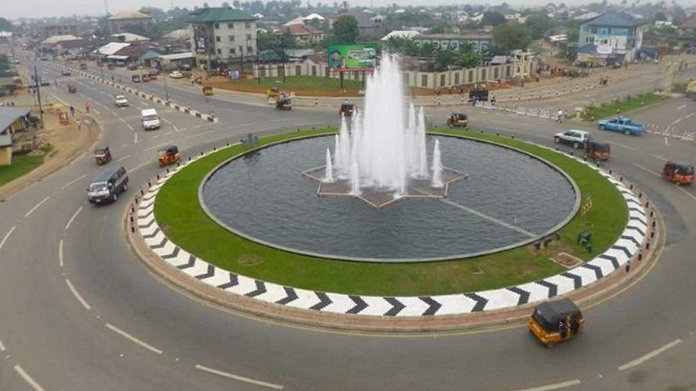
Akwa Ibom State, located in southern Nigeria, is a culturally diverse region with a population of over 5 million people. The dominant language is Ibibio, an Eastern Benue-Congo language spoken by around 60-70% of the population. The Ibibio people, the dominant ethnic group, are known for their rich cultural practices, art, music, and traditional festivals. The state has a well-structured system of governance, with each village or clan having its own traditional ruler. Economic activities in Akwa Ibom State include agriculture, particularly the cultivation of crops like palm oil, cocoa, rubber, plantains, cassava, and yam, and fishing, particularly in coastal communities. The oil and gas industry contributes significantly to the state’s revenue through taxes and royalties.
The state also has a budding tourism industry, with attractions like beaches, the Ibeno Sandbar, the Reigners Bible Church, and the Ibom Tropicana Entertainment Center. Tourism has the potential to create employment opportunities and generate revenue for the state. To diversify its economy, Akwa Ibom State is investing in manufacturing, hospitality, and services. The state government has established an industrial park and free trade zone to attract private investors and promote industrialization. In conclusion, Akwa Ibom State is a culturally diverse region with the Ibibio tribe as the dominant ethnic group.
2. Cross River
- Capital: Calabar
- Tribes: Efik, Ibibio, Bekwarra, Efut, Ejagham, etc
- Languages: Efik, Ibibio, Bekwarra, Ejagham, Bete-Bendi, Bokyi, Abanyom, Mbembe, Tiv, etc
- Economic Activities: Agriculture, Oil and Gas, Tourism, Fishing, Mining, Manufacturing, etc
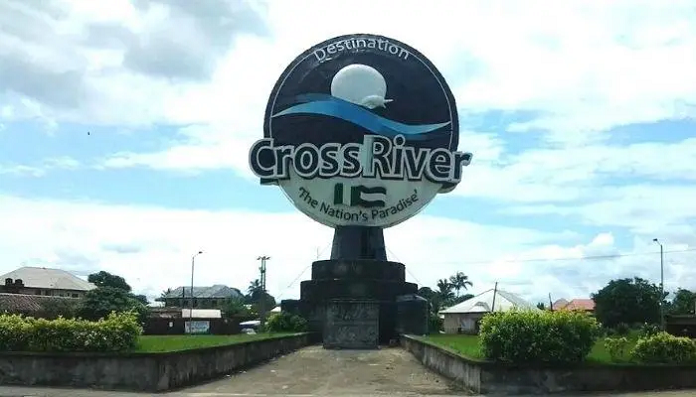
Cross River State, located in southern Nigeria, is home to various ethnic groups and languages, including Efik, Ejagham, Bekwarra, and Bette. The Efik people are known for their ancient monarchy system and traditional ceremonies, while the Ejagham tribe is known for their rich culture and the famous Ekpe secret society. The Bekwarra tribe is mainly found in the Bekwarra Local Government Area, and known for their agricultural practices and festivals. The Bette community is located in Ikom Local Government Area and is known for its unique cultural practices.
Cross River State is a hub for various economic activities, including agriculture, tourism, oil and gas, and fishing. Agriculture is a major contributor to the economy, with the annual Calabar Carnival attracting tourists from around the world. Tourism is also a major contributor, with attractions like the Obudu Cattle Ranch, Tinapa Business and Leisure Resort, Agbokim Waterfalls, Kwa Falls, Drill Rehabilitation Centre, Cross River National Park, and cultural festivals. Oil and gas are also significant economic activities in Cross River State, with several oil wells contributing to Nigeria’s oil production. Fishing communities, particularly along the coastal areas, engage in both artisanal and commercial fishing, catching various species of fish, shrimps, oysters, and other seafood, contributing to the local economy and providing livelihoods for many.
3. Bayelsa
- Capital: Yenagoa
- Tribes: Ijaw, Nembe, Ogbia, Epie-Atissa, Izon, etc
- Languages: Nembe, Ogbia, Epie-Atissa, Izon, Ijaw, etc
- Economic Activities: Fishing and Aquaculture, Agriculture, Oil and Gas, Trade and Commerce, Tourism, etc.
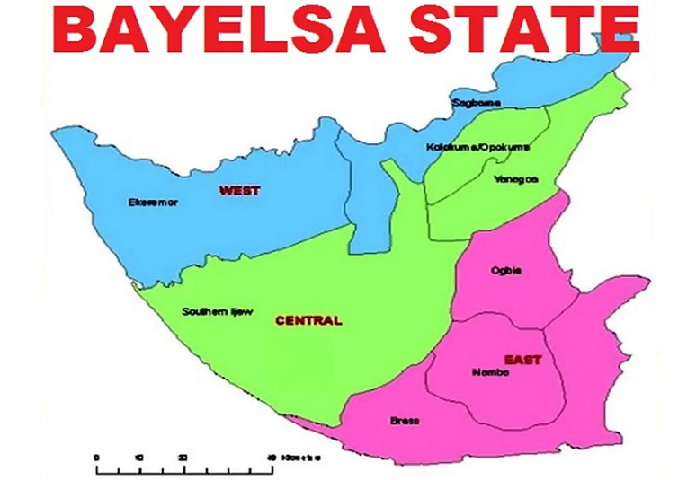
Bayelsa State is agriculturally and economically rich, with its people engaged in diverse and symbiotic activities. The linguistic diversity adds to the cultural richness and vibrancy of the state, making Bayelsa a significant part of Nigeria’s cultural mosaic. Ijaw, one of Nigeria’s largest languages, is predominantly spoken in Bayelsa State. Other languages include Nembe, Ogbia, Epie-Atissa, and Izon. English is the official language, used for communication between different ethnic groups. The Ijaws are the dominant tribe, known for their rich cultural heritage, fishing skills, and association with waterways. Other significant tribes include Nembe, Ogbia, Epie-Atissa, and Izon. Each tribe has unique customs, traditions, and socio-economic activities.
The state’s economy is primarily driven by fishing and aquaculture, agriculture, the oil and gas industry, tourism, and trade. The Niger Delta region’s abundant fishery resources provide income and sustenance for the local population. The state’s fertile land supports agriculture, with common crops like plantains, palm oil, cassava, yam, and vegetables. The state’s oil and gas reserves contribute significantly to the economy, with oil companies and related services providing employment opportunities. The state’s ecological diversity, beautiful landscapes, and pristine waterways attract tourists. Yenagoa, the capital city, serves as a commercial hub, attracting small-scale businesses engaged in retailing, wholesale distribution, and informal sector enterprises.
4. Rivers
- Capital: Port Harcourt
- Tribes: Ikwerre, Ogoni, Kalabari, Obolo, Ekpeye, Ibani, Okrika, Etche, and many others
- Languages: Ogoni, Kalabari, Obolo, Ekpeye, Ibani, Okrika, Etche, Ikwerre, etc
- Economic Activities: Manufacturing and Industries, Fishing and Aquaculture, Agriculture, Oil and Gas, Trade and Commerce, Tourism, etc
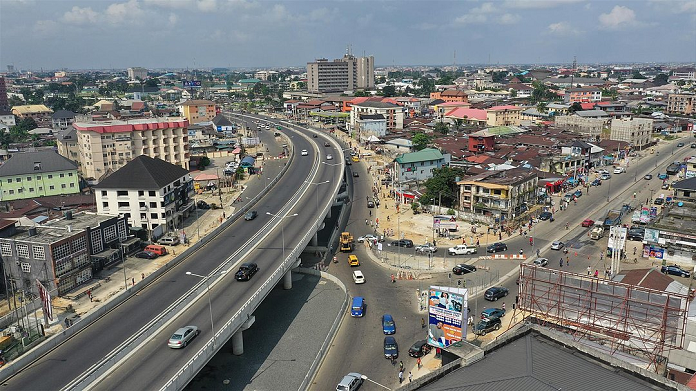
Rivers State, located in southern Nigeria, is home to various ethnic groups with distinct languages and cultures. The major languages spoken in the state include Ikwerre, Kalabari, Okrika, and Ogoni. The Ikwerre people are the largest ethnic group, primarily found in the Obio/Akpor and Port Harcourt Local Government Areas. The Kalabari people, predominantly found in the southern part of the state, speak the Kalabari language due to its historical significance and population. The Okrika people, also found in the southern part of the state, speak the Okrika language, which serves as a unifying factor for the Okrika ethnic group. The Ogoni people, mainly found in the northern part of the state, speak the Ogoni language, known for their struggle for environmental justice. Other languages spoken in Rivers State include Opobo, Ibani, Engenni, and Ekpeye.
Rivers State is known for its rich ethnic diversity, with dominant tribes such as Ikwerre, Kalabari, Okrika, and Ogoni. The state’s diverse economy includes oil and gas, maritime industry, agriculture, wholesale and retail trade, and tourism. The state capital, Port Harcourt, attracts traders from various parts of the country and beyond. Tourist attractions like Port Harcourt Tourist Beach, Isaac Boro Park, Bonny Island, Finima Nature Park, and the famous Port Harcourt Pleasure Park contribute to the local economy through hospitality services and tourism-related businesses.
5. Delta
- Capital: Asaba
- Tribes: Igbo, Itsekiri, Isoko, Urhobo, Ijaw, Uvwie, Ukwani, Olukumi, Ika, etc
- Languages: Urhobo, Igbo, Itsekiri, Isoko, Igala, etc
- Economic Activities: Manufacturing and Industries, Fishing and Aquaculture, Agriculture, Oil and Gas, Trade and Commerce, Tourism, etc.
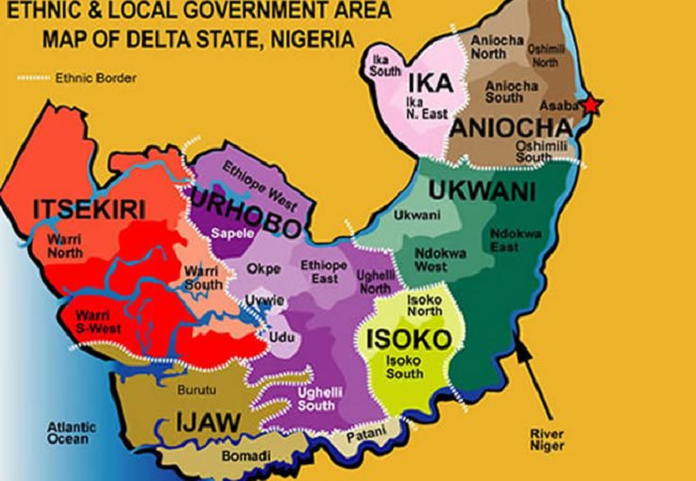
Delta State, located in southern Nigeria, is renowned for its diverse cultural heritage and diverse ethnic groups. The state is home to the Urhobo, Itsekiri, Ijaw, Isoko, and Ndokwa tribes, with the Urhobo being the largest ethnic group and the Itsekiri being the most prominent. The Urhobo people have a rich cultural heritage, a distinct language, traditional religion, and rites, and are known for their farming skills, entrepreneurship, and active participation in politics and commerce.
The Itsekiri people, a significant tribe in Delta State, have a rich history and are known for their seafaring skills. The Ijaw people, primarily fishermen, farmers, and traders, are prominent in the riverine areas. The Isoko people, primarily farmers, are known for their agricultural activities. The Ndokwa people, located in the northern part of the state, are predominantly farmers.
Delta State’s economic activities include oil and gas exploration, agriculture, fishing, trading, and manufacturing. The state is home to several oil and gas companies, contributing to Nigeria’s oil production. Agriculture, particularly oil palm, rubber, cassava, and yam, is vital, and fishing and trading are prevalent along the riverine areas. The state also has a thriving manufacturing sector and a growing tourism industry.
6. Edo
- Capital: Benin City
- Tribes: Edos, Esans, Afemais, Etsako, Owan, etc
- Languages: Esan, Afemai, Etsako, Owan, Edo, Etuno, Okpamheri, Ake-Ievbu, etc
- Economic Activities: Agriculture, Oil and Gas Production, Manufacturing, Mining and Commerce, etc
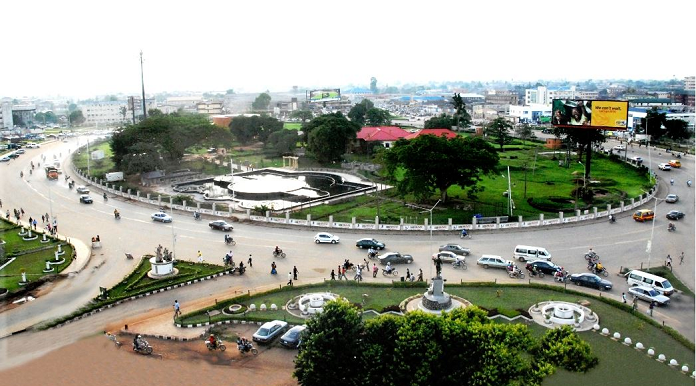
Edo State, located in southern Nigeria, is renowned for its rich cultural heritage, including historical landmarks like the ancient Benin City walls, the Royal Palace of the Oba of Benin, and the National Museum. The dominant tribe is the Edo people, also known as the Bini people, who have a strong cultural identity and are known for their art, traditional festivals, and historical achievements. Other notable tribes include the Esan, Afemai, Owan, and Akoko-Edo, each with their own distinct language, customs, and traditions.
Edo State’s official language is English, but the Edo people have their own language called Edo or Bini, which is also widely spoken, especially in rural areas. The state’s diverse economy includes agriculture, oil and gas industry, mining, manufacturing, and tourism. Agriculture is a major economic activity, with fertile lands suitable for the cultivation of crops like rubber, oil palm, cocoa, yam, cassava, and vegetables. The state government has implemented policies to attract investors and promote the establishment of more manufacturing companies.
